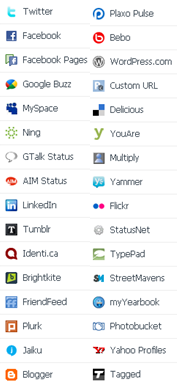Do you remember Delicious, Google Bookmarks, Diigo, ma.gnolia.com, Mixx.com or others? Most of these have been pushed aside by users flocking to Facebook, Twitter or Xing.
- Article source – Ubiquitous sharing: Real insight?
This tip-filled guide will show you how to become a smarter networker and social media user by doing less.
- 1. Ubiquitous sharing is in
People want to know:
- – What you are doing: Twitter, Identi.ca
– Where you are doing it: Foursquare
– Who you are doing it with: Flickr
– What you like: Blog
Get the next post first by signing up with your email:
Once upon a time, we only shared that information with friends and family, if at all; now we broadcast it to the world. Are we willing AND able to keep up with this WEEKLY FLOOD of info-bytes, including
- – 300 Facebook wall posts (from the average 120 friends),
– 4200 tweets (from the average 300 followed who tweet three times a day), AND
– 4 daily blog posts averaging 600 words apiece (assuming 30 blog subscriptions via email or RSS).
This over-abundance illustrates how difficult it is to keep up with the sheer volume of information from these weak ties. Worst is that some post the same stuff to several networks in a bid to save time. But does your Facebook fan want to see the same message elsewhere? Probably not. So why do it?
A recent statistic suggests that less than 1 percent of re-tweet recipients actually click on it. How many of those actually take the time to read the post they were referred to is another matter.
Plus, participation rates drop or rise depending on the season. In summer (in the northern hemisphere), our Social Media Monitoring group on Xing experiences a drop in participation. Of course, people with a life tend to want to enjoy the nice weather instead of commenting on discussion boards.
- 3. Sharing is caring
This means that you need to provide open communication avenues. For instance, recently I had a social media manager from a major German social network ask to join our Social Media Monitoring group on Xing. How surprised I was to discover that this ‘expert’ had disabled the feature that would enable the groups’ he is a member of to send him an email.
If you want to network you need to enable other group members to communicate with you. By tuning out, why join? Is it to get the group’s logo/badge to put on your profile? This is another example of why social networking groups fail because of their unsocial members.
Why not make a promise and keep it, as we did on our Facebook page:
- OUR PROMISE
I will post about 3 things each week like polls, requests for comments or interesting videos. All I ask is that you give me permission by listening.
So far, nobody has complained that three posts are too few…
Bottom line – take aways
Clearly we must treat our friends, Facebook or otherwise, with respect and courtesy.
- a) We must invest time in relationships, adding quality content and growing our channel. If you lack the energy, time or willingness to share and converse, think twice about entering the game – please focus.
- b) Stream of consciousness may be desirable from celebrities like tennis star Rafael Nadal or Inka Grings, who scored at FIFA’s 2011 Women’s World Cup. But in your case, not so much detail – less is more.
- c) Numbers don’t matter much, whether on Twitter, Facebook or elsewhere online. Of course, 100 engaged, active followers are much better than 50,000 inactive ones, but what matters most is whether they have or will purchase your product. Rent must get paid.
- d) Finally, the most useful data gives early insight into whether a product/strategy works or fails, and why. This is achieved through internal mining of our social network information (e.g., what stories people like, where we get what type of feedback), which is the antithesis of some agencies’ specious and self-serving studies.
Tip: To find out more about the tips and tricks we provide about quality social networking and weak ties include the words ComMetrics and/or CyTRAP in your search.
As always, the comments are yours! How would you suggest making sharing more useful for Facebook friends, blog readers or Twitter followers?
How we help
CyTRAP Labs helps non-governmental organizations (NGOs), non-profits, governments and brands engage their target audience through social media by assisting with development of an effective social media strategy and mentoring through the implementation process, conducting social media audits and supporting your efforts regarding corrective actions and improvements.
Start a conversation! Email us at info [at] CyTRAP [dot] eu or call us at +41 (0)44-272-1876.

Pingback: Urs E. Gattiker
Pingback: World Economic Forum
Pingback: DrKPI Urs E Gattiker
Pingback: Social Media Tipps
Pingback: Urs E. Gattiker